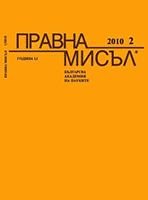Избори за членове на Европейския парламент от Република България
Elections for Bulgarian members of the EU Parliament
Author(s): Stamen YanevSubject(s): Law, Constitution, Jurisprudence
Published by: Институт за държавата и правото - Българска академия на науките
Summary/Abstract: CONSTITUTIONAL LAW // Bulgaria, like Romania, joined the European Union on 1 January 2007 and since then all European legislation has been part of the Bulgarian legal order. Therefore a whole new election procedure had to be introduced for the election of members of European parliament from the Republic of Bulgaria. The present article provides a brief historical overview of the evolution of the European Parliament and its procedure from the appointment to the election of its members. In addition, it summarizes the Bulgarian experience in the same procedure from appointment to election between the date of the Accession Treaty till the first election in 2007 and the further development of the election process in 2009. The article also comments on recent developments in the elections, which were introduced in EU member-states after the Lisbon Treaty. The effect of these changes will, however, become clear in the next European elections in 2014. The paper has the ambition to analyze for the first time Bulgaria’s European elections and to introduce the idea held by German scholars about the specificity of European elections. Due to the fact that European policy is not so close to the people’s day-to-day activities and that there is not much "at stake to be decided" in European elections, the latter are characterized as second-order national elections. Furthermore, the author explains the nature of the first and second-order national elections and describes the voters’ electoral behavior in each of them. The article gives an overview of the Election of Members of the European Parliament from the Republic of Bulgaria Act and its amendments since its adoption in 2007 to the present day. It comments on the introduced requirement for residency to differentiate between the exercising of active and passive suffrage. The novel aspects of the election process in Bulgaria are highlighted and discussed in detail. Finally, the author adopts the view that with the Lisbon Treaty European elections will be transformed from second-order national elections to first-order national elections, and that these elections should influence and change the decision-making process in Europe. With the two European elections Bulgarian citizens were also involved into this process and could feel as citizens of the European Union. The Bulgarian start in this process is a fact despite the reminder that every start faces difficulties. The difficulties are part of the European integration process, and the latter, urged by citizens of the Union, also legally incorporate Bulgarian citizens.
Journal: Правна мисъл
- Issue Year: LI/2010
- Issue No: 2
- Page Range: 3-19
- Page Count: 17
- Language: Bulgarian
- Content File-PDF

